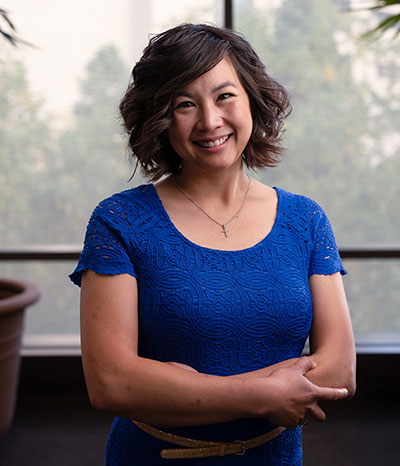Tackling Pancreatic Cancer, Bench to Bedside
by Staci Vernick
Biobank of tumor tissue and advanced molecular profiling steer researchers toward new targeted therapies
Other than a fleeting moment in high school when she thought about becoming a pianist, Eileen Carpenter, M.D., Ph.D., has always had a career in science and medicine in her sights.

Eileen Carpenter, M.D., Ph.D.
Photo credit: Erica Bass
The daughter of a computer scientist and pharmaceutical research scientist, Carpenter had an early interest in science. But it was the untimely death of her mother, Lydia, to metastatic pancreatic cancer as Carpenter was starting high school that inspired her educational path and life’s work.
Now, Carpenter is a gastroenterologist who specializes in diseases of the pancreas. She sees patients at Rogel and the VA Ann Arbor Health System.
She also leads a translational research laboratory that studies pancreatic cancer at the molecular level—how it develops, metastasizes and eventually becomes resistant to therapy. Their goal is to identify new therapeutic targets and strategies to overcome chemoresistance so patients may live longer, healthier lives.
While much scientific progress has been made against the relatively rare disease—in the U.S., 1.7 percent of people will be diagnosed in their lifetime—the 5-year survival rate is only 12.8%, according to the National Cancer Institute.
About 90% of pancreatic cancers arise from precancerous lesions called pancreatic intraepithelial neoplasias, or PanINs, Carpenter says. Too tiny to be detected by traditional imaging techniques in clinical care, they can only be easily studied in resected pancreas tissue in the lab.
"We have found that PanINs are prevalent in most of the healthy population," Carpenter says. "We all have them, but pancreatic cancer is relatively rare, so there must be something in these PanINs that triggers the progression to cancer."
"That’s what we’re trying to uncover."
Gastroenterologists are typically the first-line specialists for patients with a suspected pancreatic mass, and biopsy is a first step toward diagnosis. Carpenter and her colleagues have built a robust biorepository of pancreatic tumor biopsy samples on which they perform single-cell gene sequencing and other molecular techniques.
"This patient-derived organoid bank is essentially a biorepository representing each patient," she explains. "A patient’s tumor is grown in a dish and serves as an avatar that we can use for drug testing, molecular profiling and functional studies."
Her lab is also interested in the precancerous stages of the disease. The remaining 10% of cancers arise from pancreatic cysts, which do show up on CT scans, meaning it may be possible to identify patients as candidates for preventive surgery, Carpenter says.
Running single-cell RNA sequencing and spatial transcriptomics on biorepository samples, her lab is working to identify biomarkers to guide therapeutic decisions.
"When the incidence of pancreatic cancer is really low compared to the number of people who have these cysts, it is hard to figure out who will develop it and who will not," she says.
"It’s like finding a needle in a haystack. But that’s what makes it so worth studying."
A rising star
With the dream of becoming a scientist and running her own lab, Carpenter knew she’d need a solid foundation of problem-solving skills. She chose the Albert Nerken School of Engineering at the Cooper Union for the Advancement of Science and Art for her undergraduate studies.
Eight years of training at Stony Brook School of Medicine culminated in an M.D.-Ph.D. in Molecular and Cellular Pharmacology. Her dissertation focused on identifying therapeutic targets in the PI3K molecular signaling pathway which is heavily implicated in pancreatic cancer.
Then it was on to U-M’s School of Medicine for a combined residency in internal medicine and fellowship in gastroenterology in their Physician-Scientist Training Program.
"Having grown up in New York I had never been to Michigan prior to my training, but it turned out to be the best decision of my life," she says. "U-M is one of those unique places where they provide a supportive environment for their junior faculty but academically it’s very vigorous."
Carpenter joined the faculty as assistant professor in 2021.
"There’s an excellent working group of pancreas clinicians and researchers here called the Pancreas Disease Initiative," she says. "It is so much easier to do research when you’re not in a desert but instead are surrounded by really great mentors and colleagues who are all working towards a common goal."
Carpenter lives in Ann Arbor with her husband, Gregory, an engineer, and their three children: sons 12-year-old James, who plays travel baseball; 8-year-old Tommy, born during her intern residency year at U-M; and their youngest, 4-year-old Lydia, who is named after her late grandmother whose memory continues to inspire Carpenter.
"Every time I get discouraged in research or in the clinic all I have to do is think of her," Carpenter said. "I think of every single pancreatic cancer patient I’m taking care of. They are really the ones that drive us to do what we do."
Continue reading the 2025 issue of Illuminate.
